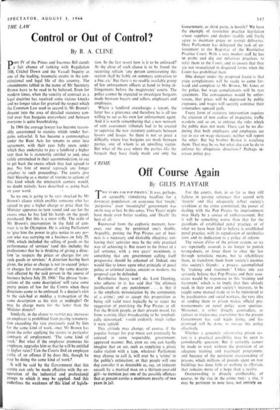Control or Out of Control?
By R. A. CLINE
In 1966 the average lawyer has become reason- ably accustomed to statutes which render bar- gains unlawful. It has become a commonplace under the Rent Acts for tenants to enter into agreement, with their eyes fully open, under which they undertake to pay a landlord a higher rent than he is statutorily entitled to and, once safely entrenched in their accommodation, to sue to get back the excess which they had agreed to pay. No hint of moral reproach any longer attaches to such proceedings. The courts give their blessing as a matter of routine to actions of this kind which the nineteenth century would, no doubt naively, have described as going back on your word.
So no one is going to be very shocked by Mr Brown's clause which enables someone who has agreed to pay a higher charge or price than the Minister approves to turn round and sue for the excess once he has laid his hands on the goods purchased. But this is a mere trifle. The scale of Mr Brown's intervention in the field of con- tract is to be Olympian. He is asking Parliament to 'give him the power to give notice to any per- son who was carrying on a business on July 20, 1966, which included the selling of goods or the performance of services' (and this includes the professions) that he is thinking of giving a direc- tion `as respects the prices or charges for any such goods or services.' A direction having been given, the price or charge is not to exceed 'prices or charges for transactions of the same descrip- tion effected by the said person in the course of business before July 20, 1966.' The phrase 'trans- actions of the same description' will raise some pretty points of law for the Courts when these directions come to be enforced. Is a doctor's visit to the sick-bed at midday a transaction of the same description as his visit at midnight? Or may he charge more for the latter than the Minister directs?
Similarly, in the clause to restrict pay increases an employer is prohibited from paying remunera- tion exceeding the rate previously paid by him for the same kind of work, once Mr Brown has given the order applying the statute to particular contracts of employment. 'The same kind of work.' But what if the employer promotes his employee, upgrades him so that he will be entitled to higher rates? Can the Courts find an employee guilty of an offence if he does this, though he may be doing the same kind of work?, It will be said by the Government that this statute can only be made effective with the co- operation of the industrial and professional groups to which it may be applied. And this underlines the weakness of this kind of legisla- tion. In the last resort how is it to be enforced? At the close of each clause is to be found the recurring refrain 'any person contravening this section shall be liable on summary conviction to a fine, etc.' But there is no readily available group of law enforcement officers at hand to bring in- fringements before the magistrates' courts. The police cannot be expected to investigate bargains made between buyers and sellers, employers and employees.
Where a landlord overcharges a tenant, the latter has a grievance and therefore he is all too willing to act as his own law enforcement agent. And it is worth remembering that a new network of rent assessment tribunals had to be created to supervise the new statutory contracts between lessors and lessees. So there is not so great a difficulty where free bargains are made between parties, one of whom is an unwilling victim. But what of the case where the parties like the bargain they have freely made and only the Government, as third party, is hostile? We have the example of restrictive practice legislation where suppliers and dealers readily and freely agree to maintain prices or restrict deliveries. Here Parliament has delegated the task of en- forcement to the Registrar of the Restrictive Practice Court. With a very modest staff he has to probe and dig out nefarious practices, to refer them to the Court. and to ensure that they are not resuscitated in disguised forms when the Court has prohibited them.
One danger under the proposed freeze is that price complainants will be ready to come for- ward and complain to Mr Brown, Mr Jones or the police, but wage complainants will be rare specimens. The consequences would be unfor- tunate, that prices will be depressed by public exposure, and wages will secretly continue their remorseless upward path.
Every form of statutory intervention requires the creation of new cadres of inspectors, traffic wardens and so on, to enforce the rules which the public does not want. There can be no dis- puting that both employers and employees see eye to eye on wage increases; neither will report the other. But big brother Brown is watching them. That may be so, but what else can he do to enforce his ubiquitous directions? Perhaps in- crease police pay.





























 Previous page
Previous page